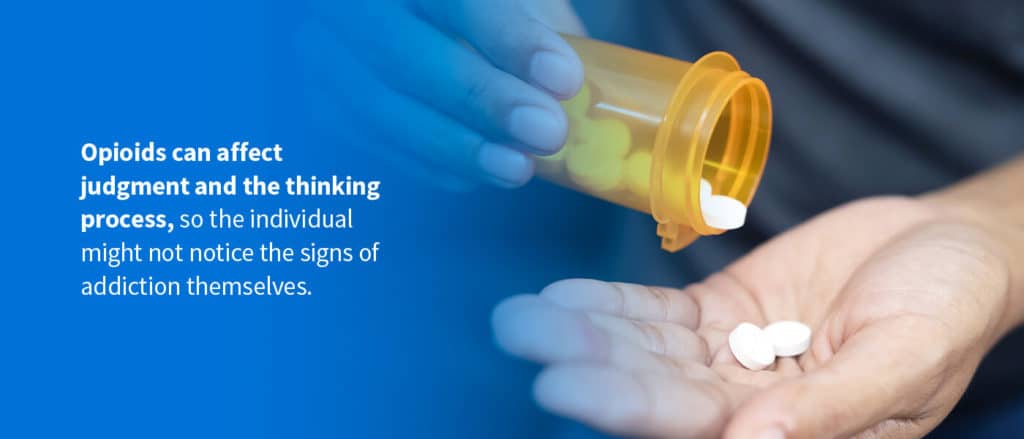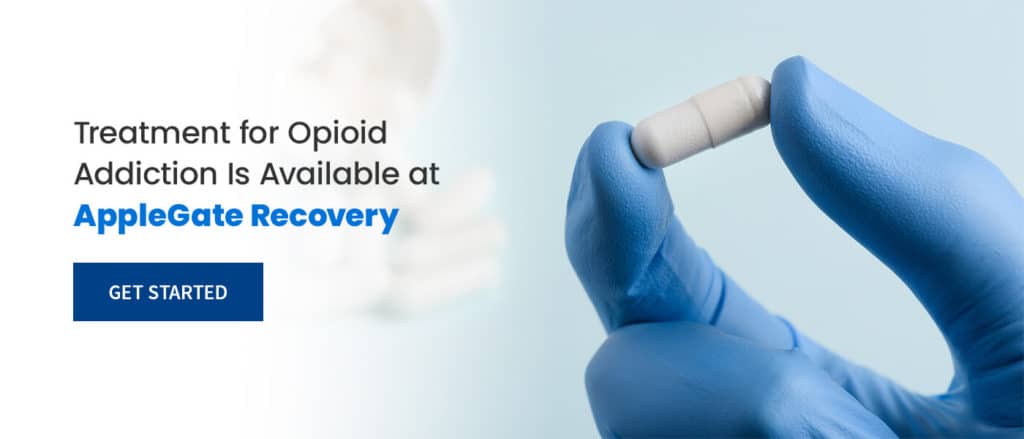Many people associate opioids with heroin or other illegal drugs. However, many opioid problems develop from prescription pain medication. Some of the most commonly used opioids include Vicodin, Percocet, fentanyl and morphine.
According to the Centers for Disease Control and Prevention (CDC), more than 191 million Americans have received a prescription for opioid pain medication. These prescriptions can help ease a patient’s pain by interacting with the body’s neurons and blocking the pain. For a short time, opioid pain medication can help a patient, but extended use may lead to opioid addiction.
Understanding the relationship between opioids and your body will help you better understand and recognize an addiction.
Consistent Opioid Use Can Cause Long-Term Damage to Your Brain
Your brain has chemical messengers called neurotransmitters that bind to receptors and produce the appropriate response. Opioids take on this role in the body, binding to receptors to block the brain’s perception of pain and flooding the system with dopamine. Dopamine stimulates feelings of euphoria and well-being.
Dopamine regulates:
- Movement
- Cognition
- Feelings of pleasure
- Emotion
- Motivation
The longer you take opioids, the higher your tolerance for them will become. You will have to take a higher dosage to feel the same effects. This increase in tolerance is the start of opioid abuse. Without increased qualities of the opioid, withdrawal symptoms will develop.
Withdrawal symptoms can include:
- Muscle aches
- Irritability
- Anxiety
- Nausea
- Vomiting
To avoid these symptoms, an individual will take more of the drug, entering into the vicious cycle of opioid abuse. Opioids can alter your brain within just a few weeks, particularly the part of the brain that regulates cravings, learning and relieving pain.
Short term effects of opioid abuse include:
- Fatigue
- Numbness
- Drowsiness
- Nausea
Long-term effects include:
- Hallucinations
- Anxiety
- Depression
- Hypoxia, or a lack of oxygen supply
- Hyperalgesia, or sensitivity to pain
If you or a loved one has been prescribed opioids, it is important to look out for these symptoms. Knowing the signs of opioid addiction will make it easier to know when it’s time to seek help.
How Opioid Use Can Damage Your Body
The side effects of opioids can impact the rest of the body as well as the brain. Here’s a breakdown of how opioids can affect various parts of the body:
- Blood: Crushed-pill injections and heroin can lead to veins collapsing, and sharing needles can increase the risk for HIV.
- Liver: Sharing needles can also lead to hepatitis, a condition where the liver becomes inflamed.
- Heart: The lining of the heart can become inflamed with the long-term use of opioids.
- Lungs: Extended use of opioids can result in a lung infection or respiratory depression. These conditions can result in slowed breathing, which may prove fatal. Opioid abuse may also lead to respiratory arrest.
- Muscles: After using opioids for an extended time, muscles may become more sensitive to pain.
- Digestive system: Abusing opioids slows down the digestive system, which can lead to constipation, nausea and a higher risk of developing other digestive problems.
- Immune system: Opioid use can also suppress the immune system, making you more susceptible to infection or illness.
- Skeletal system: Opioid use leads to a higher risk of breaking a bone.

How to Know When Opioid Use Negatively Impacts Someone
Anyone who has received a prescription for opioid pain medication is at risk of addiction due to the nature of the drug. Opioids can affect judgment and the thinking process, so the individual might not notice the signs of addiction themselves.
Understanding the warning signs of opioid addiction can help you see when you or someone you know is struggling. Look out for the following:
- Very small pupils
- Fatigue, sedation, drowsiness or nodding off
- Slowed or shallow breathing
- Constipation
- Nausea or vomiting
- Lack of coordination
- Chronic itching or scratching
- Odd changes in habits or routine
- Sudden financial issues
- Dramatic mood swings
- Taking more medication than prescribed
- Visiting multiple doctors to obtain opioid prescriptions
- Being secretive and dishonest
- Experiencing troubles with family, friends and work relationships
Catching opioid abuse early can help make the recovery process more manageable.
Reasons to Join Recovery
Struggling with opioid addiction is more common than you may think. You may feel as though there’s no way out, but recovery is still possible — no matter what stage of opioid addiction you are in.
If you need help taking the steps to recovery, keep these mantras in mind.
1. Nothing Changes if You Don’t Change Something
If you want to get better, you have to change your lifestyle. You cannot just expect to recover overnight. You have to make the effort.
2. Live Your Life Instead of Just Existing
Recovery will allow you to take control of your life and live free from opioids. You won’t have to worry about getting more supply or taking medication every time you feel the withdrawal symptoms creeping in. You can live your life without the added worry.
3. Reconnect With Yourself and Others
Addictions pull you away from who you are and those you love. Get back in touch with yourself and others by taking the steps to recover.
4. Make Your Loved Ones Proud
Your loved ones don’t want to see you struggling with opioids. Do them a favor and break free from addiction.
5. Create the Future You Deserve
You deserve a good future without opioids holding you back. Making small steps towards recovery will allow you to improve your future and open a whole world of possibilities up to you.
6. You Matter
You may think that you are hopeless and that you will never recover. Start looking toward the future. Self-doubt will not help you. You matter, so focus on recovery for you.
Treatment for Opioid Addiction Is Available at AppleGate Recovery
It’s natural to experience fear when your opioid use seems to have gotten out of control. If you’re afraid of taking those first steps toward recovery, the compassionate team at AppleGate Recovery is here for you. Our evidence-based services include medication-assisted treatment and personalized addiction counseling. We’ll help you confront and overcome your fears. Learn more about how you can get started today.

Contact AppleGate Recovery Today
If opioid addiction is impacting your life or the life of someone you care about, reach out to our treatment center. We are here to provide the support and care you need to take the first step toward recovery.
Call 888.488.5337

